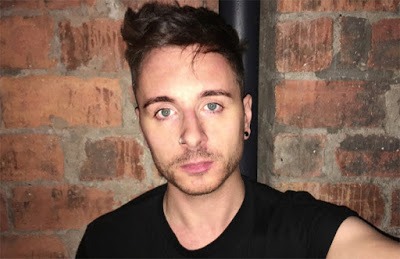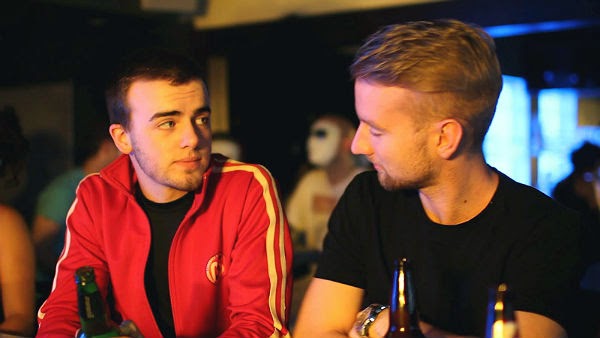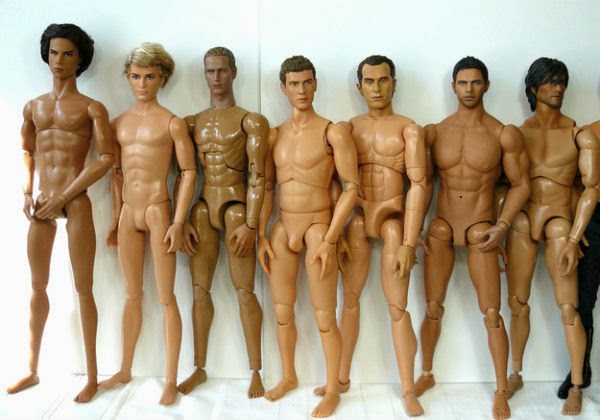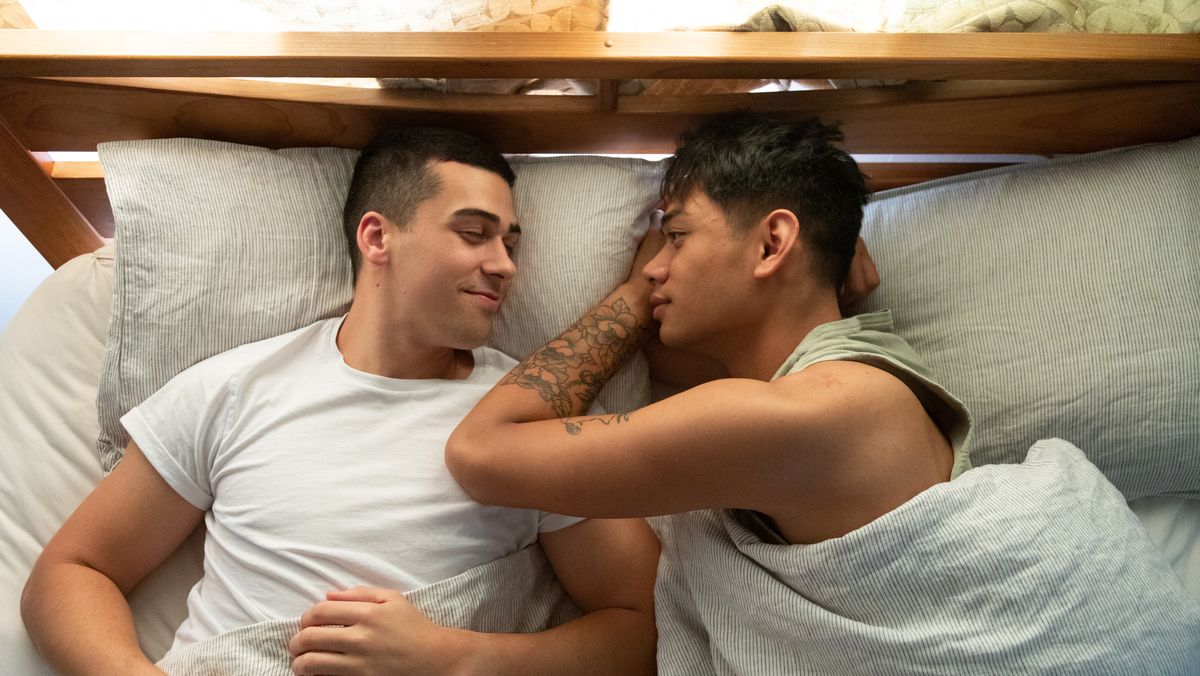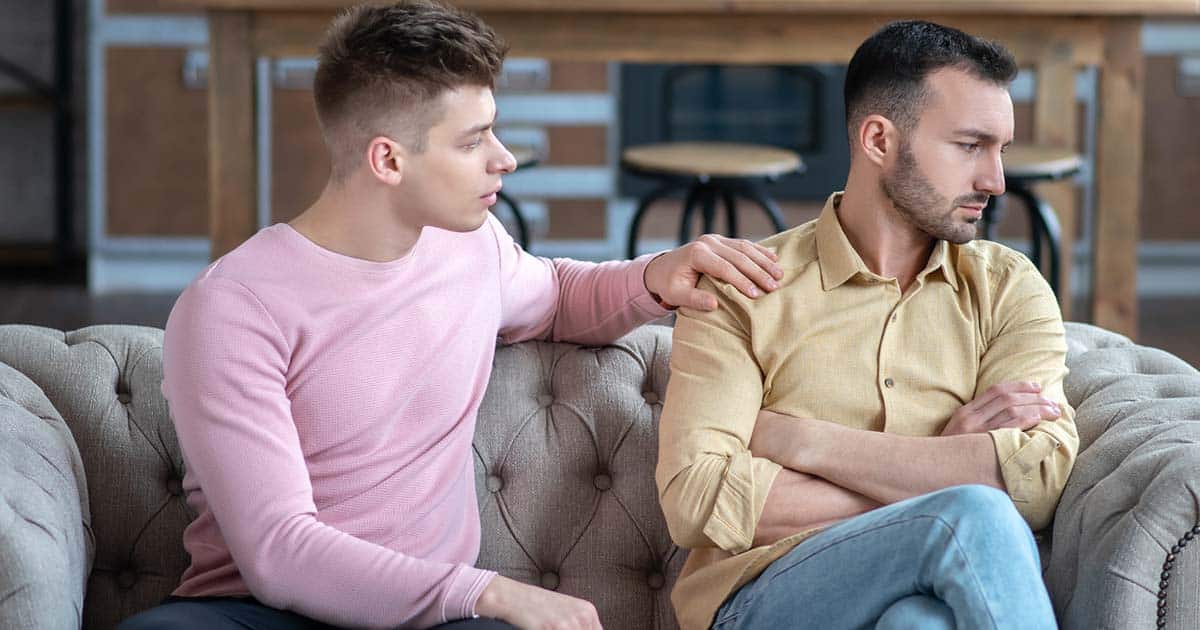How LGBTQ Wedding Planners Make Big Gay Wedding Dreams Come True
Written by Joseph • September 3, 2019
Same-sex marriage in the US has been legal for years now, but queer couples still face wedding hurdles. Meet the planners who want to change that. By the time I turned 25, I had been a member of the bridal party in three weddings — one each year, for three years in a row. The first […]
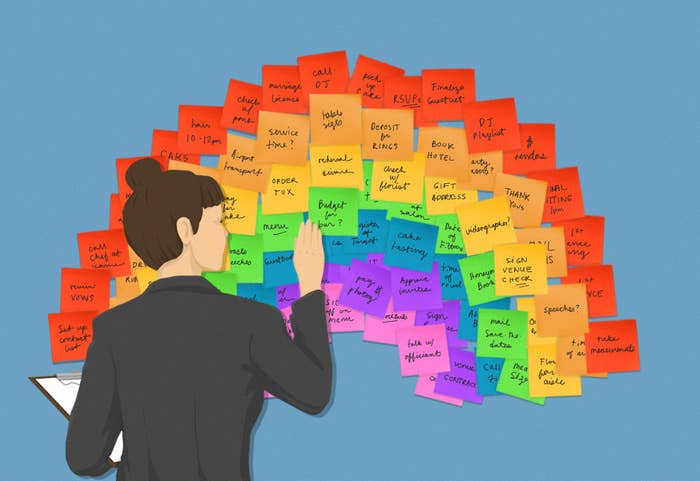
Same-sex marriage in the US has been legal for years now, but queer couples still face wedding hurdles. Meet the planners who want to change that.
By the time I turned 25, I had been a member of the bridal party in three weddings — one each year, for three years in a row. The first was when I was 22. My best childhood friend picked out highlighter-yellow bridesmaid dresses for her mostly pale friends, and there’s still a video of me somewhere on YouTube, reading out my maid of honor speech as I glowed in the dimly lit room. One year later, I was an MOH again. This time, I had scored a better bridesmaid dress, but something else was different, too: I was fully out as a gay woman.
The bride, who came from a strict Baptist family, told me her parents weren’t exactly thrilled at the idea of me bringing my then-girlfriend to the reception. But she immediately defended me and made sure I felt comfortable bringing anyone I wanted as a date. My girlfriend ended up breaking up with me two weeks before that wedding, and so, at the reception, I shoved half a bag of mini Reese’s cups in my mouth from the “candy bar,” which was predictably void of alcohol. As I sat at the bridal party table, stuffing little gold wrappers under the edges of my plate and willing myself not to text my ex-girlfriend, I also became painfully aware that the structure of the traditional heteronormative wedding was never going to be a safe environment for me.
I stared at all the straight couples dancing stiffly to country music and knew that if I confessed to any of them what was going on with me in that moment, they would be polite at best and cruel at worst. I tried to imagine — should I ever get over this comically painful heartbreak and actually find someone to marry — what my wedding would even look like.
For years I had scoured the internet for videos of queer, trans, and nonbinary folks’ weddings to try to get an idea of what I would do or how I would want things to look. I made a private Pinterest board called “She Keeps Me Warm,” after the extremely gay Mary Lambert song, where I pinned photos of two femmes on their wedding day and signs that said “Choose a seat, not a side; either way it’s for a bride.”
Two years after that big breakup, I met my current partner on a date that started with an outdoor screening of 9 to 5 and has since led to a dog and a move to New England. Marriage has always been in our conversations. But when we fell in love, I still didn’t exactly know what a wedding would look like for me. In late May of this year, I attended my first same-sex wedding, for my friends Sylvia and Kate, two women from my Brooklyn queer community.
I knew I’d be emotional when I saw my friends in their lacy dresses walking down the aisle, and that sitting next to my partner would add even more meaning to this moment. What I didn’t know was that I would start to sob as I saw my friends exchange vows and that my shoulders would shake so hard that Kate’s aunt, who sat behind me, would affectionately call me “crybaby” for the rest of the night. For the first time in my life, I saw what my future might look like.
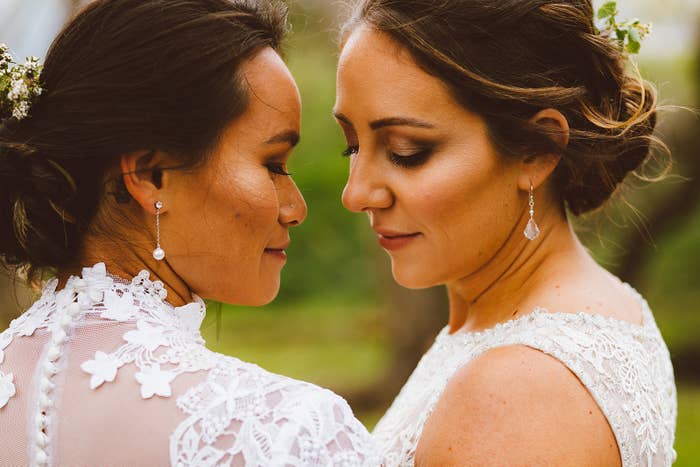
Kate and Sylvia, who were a little too focused on their own nuptials to notice how hard I was crying in the third row, told me later that they got exactly the wedding day they wanted — but that doesn’t mean they didn’t hit any snags in the planning process, which Sylvia handled herself.
“When Kate and I would go to visit vendors, many of them assumed we were close friends because of these preconceived notions of what being queer is supposed to look like, and we don’t fit that mold,” Sylvia said. “We even had a potential caterer ask which one of us was the bride!”
In fact, I saw an example of that willful ignorance firsthand at their wedding, when a hotel employee stopped me and my friends as we headed to the shuttle for the ceremony. “A guest left this bottle of wine for the bride,” the employee said. “Is anyone here a bridesmaid?” My friends and I tried to politely explain that the couple had chosen not to have a bridal party and that there were, in fact, two brides. “So, you know the bride?” she repeated, clearly not wanting to hear the words coming out of our mouths.
Ainsley Blattel, a queer wedding planner in New York City, has seen this kind of clueless interaction at countless rehearsals, weddings, and receptions.
“Even vendors that know they’re working with a queer couple say, ‘Oh, is that for the bride or the groom?’ And it’s like, ‘Y’all know we don’t have a groom today,’” Blattel told me when I interviewed them at home in early June, clapping their hands to emphasize each word. “‘How did that just come out of your mouth? How are you not aware of that?’ There is no space in people’s minds for queer relationships.”
Blattel has been planning weddings for three years, first working at a company called Modern Rebel, and now as a freelancer. In early June, when I met them at a rehearsal for a wedding at the Akwaaba Mansion in Bed-Stuy, Brooklyn, they were wearing a button-up shirt and dapper suit jacket. After Blattel met with the couple’s families to run through where to stand, what to say, and how to walk during the ceremony, they also made a point to talk to the DJ about something important: pronouns.
“The couple is queer, and they might have some guests who don’t identify as male or female,” Blattel said. “How do you address their guests when you invite them to come on the dance floor?”
The DJ caught on quickly. “I’m a fan of ‘everybody.’”
On the day of the wedding Cait Weisensee, Blattel’s assistant for the event, pointed out to me that many wedding planners might not think to request this of the DJ.
“Ainsley thought of that because Ainsley lives in this world,” she said — and they, personally, would not feel comfortable being called onto the dance floor as “ladies and gentlemen.”
Blattel thinks of themselves as the safety net when it comes to making sure their clients — as well as their clients’ guests — feel comfortable at each wedding. And with queer couples, this often also involves helping them navigate a day spent with family members who may not be fully accepting of their queer identities.
“Sometimes, someone says, ‘If you see my mom talking to me, get me out of this situation as fast as you can,’ Blattel said. “They want to have fun on their wedding day, and if part of that fun is not having their family be really shitty about their relationship, I’m gonna get them out of that. I can touch the clipboard and say, ‘I’m so sorry, I need to steal them away for the moment.’”
Weisensee chimed in: “That clipboard is magic.”
Some queer weddings might also include the opposite situation: Clients whose families are simply not invited, or who decline to attend. Cindy Savage, a wedding planner and cohost of the queer wedding podcast “Super Gay Wedding,” recently moved back to St. Louis, her hometown, from Chicago. Her entire business plan for her company, Aisle Less Traveled, is to reject what the wedding world considers “tradition” — for both her straight and queer couples. Her one basic rule: Come into the wedding with as few preconceived notions as possible.
“I assume that both members of the couple will be involved in the planning process, and I don’t assume that family will be involved in the wedding,” she told me. “I just say, ‘Are you planning to involve family?’ — not ‘What time are you planning to do the father-daughter dance?””
Blattel and Weisensee said the phrase “chosen family” comes up a lot in conversations with their clients, whose friends are often involved in their weddings in roles that might traditionally be filled by family members.
Nicholas Catania and Ryan Sullivan were married in 2017 in Tampa, Florida. The couple, known locally and by their blog and Instagram as the Never Have I Ever Guys, said it was important to them to feature their close friends in the ceremony. They each have several brothers, who stood with them at the altar, but their friends were just as central. Each groom chose a close friend do a reading, and their friends Daniel and Rob co-officiated the wedding.
“We have shared a lot of similar experiences together that others may not completely understand,” they said in a follow-up email. “They have always been there for advice and moral support and we knew they would take care of our special day like it was their own.”
Savage said she’s noticed that, no matter whether she’s working with a queer or straight couple, many vendors only want to focus on the bride. “The majority of the discrimination that happens in the queer wedding industry is not about homophobia; it’s about sexism,” she said. Given that the straight couples Savage has planned weddings for are working with an openly feminist, queer planner, they are generally also looking to buck tradition. And she’s found that a lot of wedding venues still have a hard time accepting anything even slightly unconventional, such as having two aisles instead of one. A planner, especially one who understands the queer experience, can face any of those uncomfortable moments for them.
“What planners do for the couple is do all the coming-out for you — we’re the soldiers,” Savage said. “Once you hire me, you don’t ever have to come out to a potential vendor, because I’m the one contacting them. … A big thing we do is screen the vendors so that what’s coming to you is actually safe.”
Savage, who plans weddings all around the country, is currently planning a wedding for Cheryl Davidson and Kat Schwartz, who are getting married in Ranchos Palos Verdes, California, next May. They wrote in an email that they chose to work with a queer planner after speaking to other coordinators who would say things like “I am not opposed to working with a gay couple” or would keep making reference to there being a groom. Savage deals with any vendors who might ask obnoxious questions.
The couple said that even in California they have found venues that won’t accept same-sex couples based on owners’ religious views. In California, the Unruh Civil Rights Actprotects against discrimination at venues including hotels and restaurants, among other businesses. But Davidson and Schwartz’s story is a familiar one in this country, where same-sex couples still have to fight against discrimination from wedding vendors. This October, the Supreme Court will hear two major cases that will determine whether LGBTQ individuals countrywide should be protected by federal antidiscrimination law.
“Going dress shopping and [having] to tell salespeople repeatedly that we are two brides is annoying,” the couple wrote. “We went to a bridal expo in Pasadena, and there was clearly nothing geared towards gay couples.”
At a planning meeting for one of Blattel’s client couples — two women who asked not to be named because of the nature of their work — I got a glimpse into the difference it can make to work with a wedding planner who understands a queer couple’s unique priorities.
One of the brides noted that she wanted to make sure the money she spent on her wedding would be going back into the queer community. “When possible, can we try not to hire straight men?” she asked. Blattel nodded and smiled, reassuring the brides that the photographer they work with is queer.
“Queer couples waited decades and generations to get the right to be legally married, so they get to rewrite the rules,” Blattel told me. “If they want a small wedding with little to no family, go for it. If the brides both want to be walked down the aisle by their fathers, right on. Lacy dresses? Sure? Suspenders and suits? Fine. None of it? That’s OK, too.”
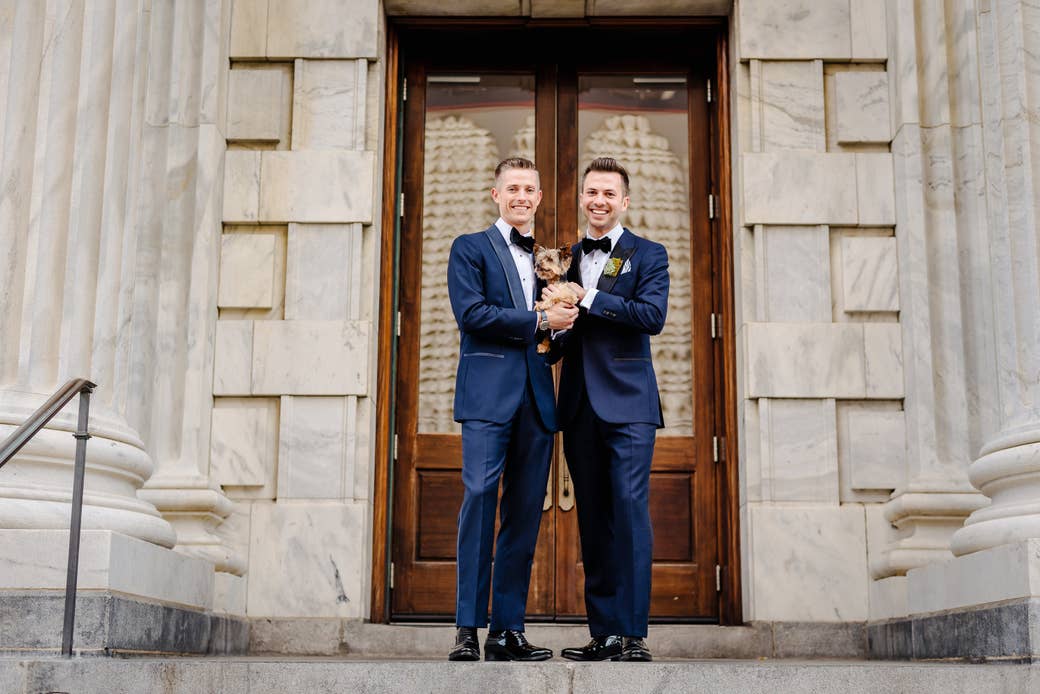
When I look back now at that secret Pinterest board I started in my early twenties, it’s full of white frilly dresses and femme women marrying other femme women. Every photo is queer, but it’s still heavily influenced by the idea of the kind of wedding I thought I would have if I were marrying a man — from the epic proposal and the big bridal party to the cake-cutting at the reception and the first dance with my dad.
At the time, I had no blueprint for anything else. But now that I’m dating the person I want to marry, I realize that our wedding, with one spouse who uses nonbinary pronouns, won’t be the straight-influenced day I had in my head from the time I was little.
Weisensee, who only started working as a wedding planner a few years ago, experienced something similar. She said she first started obsessing over weddings as a little girl, when she watched her first Disney movie, The Little Mermaid. When she was 7, her grandmother made her her first wedding dress, with a Princess Diana–style train.
As she hit middle school, she started seeing her classmates couple up for the first time, but none of them were gay. ”No one said ‘you can’t be gay,’ but I looked around and didn’t see any other queers, and I just wanted to fit in,” she said.
It wasn’t until Weisensee was in her twenties that she stopped pretending to be straight, fell in love with her now-spouse, Nikki, and realized she actually could have the big dream wedding she wanted as a kid. But, even in 2015, Weisensee found the process of planning disappointing. She contacted wedding planners who sent her frustrating forms that only had options for a bride and a groom, and she didn’t see examples for what a queer wedding could look like on any of the usual wedding planning sites. Now, there is a section at popular wedding site the Knot for LGBTQ weddings, but as a bride-to-be four years ago, Weisensee wasn’t seeing the blueprint she desperately wanted for her own wedding.
“While planning, I remember everything feeling harder than it should have because I felt like I had to pave the way,” she said. She listed out all the questions that were swirling around in her head: “Do we both walk down the aisle? Who walks first? Who has the rings — neither of us have pockets! Do we both have maids of honor? How does the ceremony go? Can we still quote the Bible (and make my Mandy Moore ‘love is patient, love is kind’ dreams come true)? Which of us uses the bridal suite and which has to be the ‘groom’ in a closet? Who do the vendors treat as the ‘bride’ for the day? Do our dresses have to match? Do our veils have to match? Do our rings have to match? How does the officiant ‘pronounce’ us — and who gets to kiss who?”
“There’s answers to all of these questions,” Weisensee said, “but we had to think about them, and it didn’t feel like a blessing at the time. It felt like a gay tax.”
Weisensee and Nikki were married in July 2015, one month after the Supreme Court legalized same-sex marriage in the United States. But the wedding, as much as Weisensee loved it, wasn’t exactly what she’d wished for. She got married in a park, with no reception, and she and her wife handed out cupcakes to their guests afterward; it was a very scaled-back version of the wedding Weisensee had dreamed of as a kid.
“Part of me was like ‘I wanted that fucking wedding, I wanted my dad to walk me down the aisle, and I didn’t get it,’” she said. “I’m married and I’m happy, but that could have been a better experience. And yeah, weddings are froufrou, but we deserve to have what other people have. If I want a ballgown, I deserve a ballgown.”
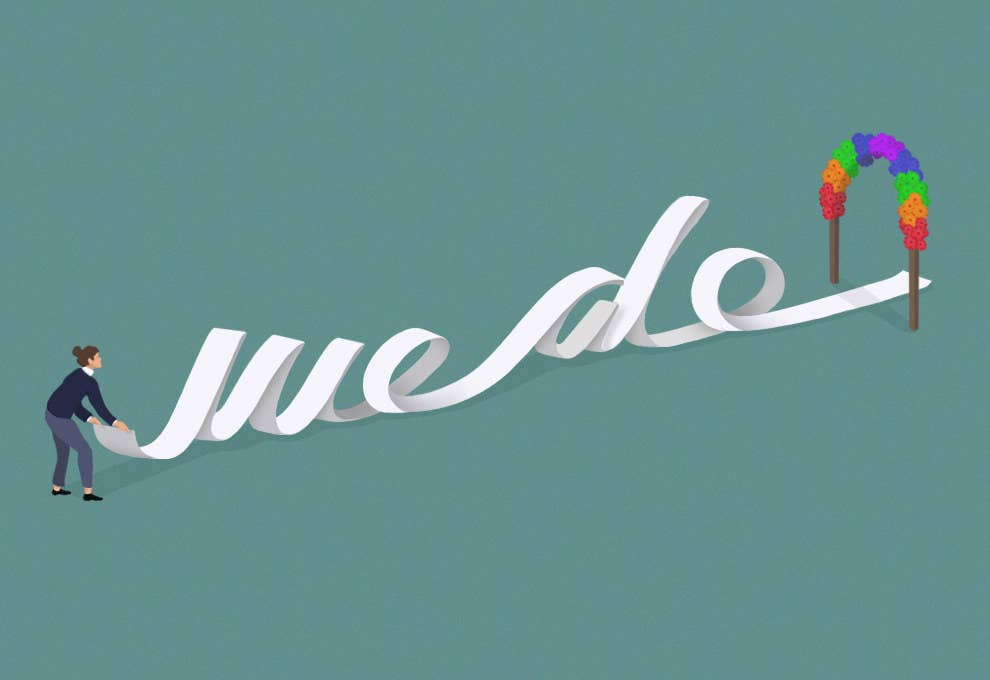
Savage said it would “make [her] queer little heart so happy” if all she did was help brides like Weisensee make their queer wedding dreams come true, but right now planning only queer weddings would not be lucrative enough to sustain her business. She has seen a significant increase in the number of queer weddings she’s done over the years, though. She estimated that in the past, 10% to 15% of her weddings were queer, while this year it’s more like 40% to 50%. Meanwhile, the percentage of LGBTQ couples nationwide who are married was still lower than among straight couples at the time of a 2017 Gallup poll, but gradually increasing.
Being a specifically queer wedding planner is a fairly lonely line of work. Savage, who plans weddings all over the country and is very well tapped into the industry, said she can count on one hand the queer planners she knows of. But the work they do is deeply meaningful for their queer clients.
“LGBTQ weddings come with a sense of victory that straight weddings don’t, because we worked so hard to get this right — and because there are still a lot of rights we don’t have,” she said.
Marriage is not necessarily something the entire LGBTQ community embraces. As the New York Times noted in June, many millennial queer couples still don’t feel that the institution of marriage is for them. As Sarah McBride, the national press secretary at the Human Rights Campaign, said in the piece, millennials have a “real concern around the fact that they can be married on a Sunday, but still be fired from their job, kicked out of a restaurant, denied services or refused housing simply because of their sexual orientation or gender identity.” So, when queer couples do choose to get married, Blattel said, it’s often important for the couples they work with to make a big statement.
One of the things Blattel loves to feature in their queer weddings is a public signing of the wedding license; this is completely optional but gives couples a chance to celebrate the moment even more. Same-sex couples were denied this moment — and the rights that come with it — for years, so making a big to-do about it seems appropriate.
Blattel told me that they’re a romantic at heart, and they’ve come up with a proposal plan for everyone they’ve ever dated in the past. Now, they’re dating someone they can see themselves marrying, but they haven’t quite figured out that proposal plan. What they do know is they are going to sign their license publicly. They’re going to be as loud, proud, and queer about it as they possibly can — and, of course, they’ll use a queer wedding planner. ●
.
.
Check out the original story here: BuzzFeed LGBTQ.
.
.
Have you found the right one, or are you still searching?

Join a gay dating site where you can meet single guys from any town or city. Rely instead on Gay Dating Solutions to do the work for you! Don’t get fooled by free offers made by other sites. Gay Dating Solutions is offering a FREE 6 month promotion ABSOLUTELY no strings, request for credit card numbers, etc…it is the only site that is truly free to join!
Sign-up now: www.gaydatingsolutions.com
Download our mobile apps: https://appurl.io/jd0jaqp0
Like us on Facebook: www.facebook.com/GayDating101
Tweet us: twitter.com/GayDating101
